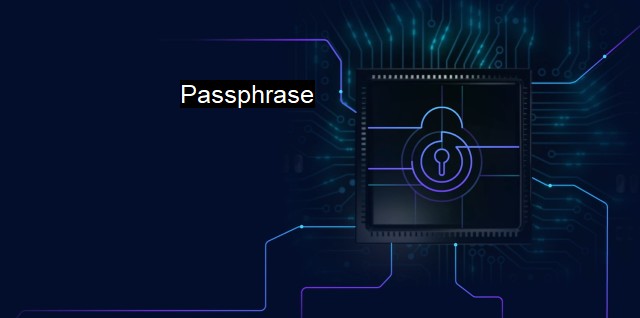What is Passphrase?
The Rising Popularity of Passphrases in Cybersecurity: Stronger, Smarter Passwords for Secure Accounts and Sensitive Information
In the digital world, increasing concerns about cybersecurity and data protection have brought our attentions to topics including what a "Passphrase" is and understanding how it aids in providing security to digital information. the concept of a passphrase is regarded as the cornerstone of security protocols, and an essential component in designing antivirus programs.A passphrase is a sequence of words or other text used to control access to a computer system, program, or data. It is akin to a password in usage, but it is generally longer for safety purposes. Passphrases are generally used to encrypt or decrypt sensitive and confidential data. Unlike passwords which may simply comprise a single word or string of numbers, passphrases typically consist of several words strung together, punctuations, numerals, and other unique syntactical elements, making it more challenging for potential hackers to acquire access.
The ability to create unique and easily rememberable phrases provides a higher degree of security, ordinarily in cryptography for encrypting and decrypting data. Thus, it plays a supremely integral role in securing network systems and online environments against cyber threats and attacks. an effective passphrase often outperforms a complex but shorter password in thwarting data breaches, largely due to the difficulty in cracking longer strings, given the time, tools, and processing power needed.
Building on the importance of stronger, larger passphrases, many cybersecurity professionals have redefined the baseline measures for creating secure passphrases. With security breaches at stake, guidelines often suggest making the passphrase a minimum of 16 characters, abutting on absurdity, humor or personal mnemonic devices, yet unique enough that it's not easily guessable by anyone who might want illicit access to your data.
Many antivirus programs also make use of passphrases to provide additional layers of security. For instance, when an antivirus program encrypts a user's sensitive information for secure storage or transmission, a user’s unique passphrase might be utilized to encrypt the data. Without the appropriate passphrase, the sensitive information cannot be decrypted and thus is effectively rendered useless to unauthorized parties who might intercept or otherwise gain access to it.
Despite all of the benefits of passphrases, they are not bulletproof and could still be compromised. There are various forms of attacks that use technological and psychological techniques to circumvent security protocols. Keylogger attacks where the attacker tracks the victim's keystrokes to determine their password or passphrase, can undermine the security of even the longest and most complex passphrase. In these cases, it's fundamental to deploy additional security measures such as adopting multi-factor authentication or virtual keyboards.
To further increase security, instruct users to periodically change their passphrases. Stale passphrases could pose a risk by giving hackers more time to crack them. Encourage users to invent new passphrases or modify old ones by adding or substituting characters. Reinforcing the significance of not sharing one’s passphrase with anyone and to install reliable and effective cybersecurity programs to guard against any potential threats and breaches.
Passphrases demand more attention to be understood, created, and maintained than conventional passwords or PINs. Still, appreciating their purpose and discipline to initiate and nurture them measuredly will reward one with a significantly secure layer around their valuable and confidential digital information.
Conclusively, the "passphrase" maintains cyber hygiene and sustains resilient antivirus defence against unauthorized access. As part of best practices in cybersecurity management, creating a strong and secure passphrase mitigates risks posed by cyber threats while elevating the probability of data integrity, leading to lessened chances of cyber security breaches.

Passphrase FAQs
What is a passphrase?
A passphrase is a string of words or characters, used to authenticate a user's identity for accessing a website, device, or application.How is a passphrase different from a password?
A passphrase and a password are similar, but a passphrase is typically longer and more complex. Passphrases often consist of multiple words and are designed to be easier to remember compared to traditional passwords that are shorter and more complex.Why are passphrases important for cybersecurity?
Passphrases are important for cybersecurity because they increase the strength and complexity of passwords. A strong passphrase can help prevent hackers from breaching a system or accessing sensitive information. In contrast, a weak or easily guessable password can leave a system vulnerable to cyberattacks.Can antivirus software protect my passphrase?
Antivirus software cannot directly protect your passphrase. However, antivirus software can help protect your computer from malware or other threats that could potentially steal or compromise your passphrase. It is still important to create a strong and unique passphrase and to use it in combination with other strong security measures to protect your identity and sensitive information.Related Topics
Multi-Factor Authentication Encryption Brute Force Attacks Keylogging Two-Factor Authentication
| | A | | | B | | | C | | | D | | | E | | | F | | | G | | | H | | | I | | | J | | | K | | | L | | | M | |
| | N | | | O | | | P | | | Q | | | R | | | S | | | T | | | U | | | V | | | W | | | X | | | Y | | | Z | |
| | 1 | | | 2 | | | 3 | | | 4 | | | 7 | | | 8 | | |||||||